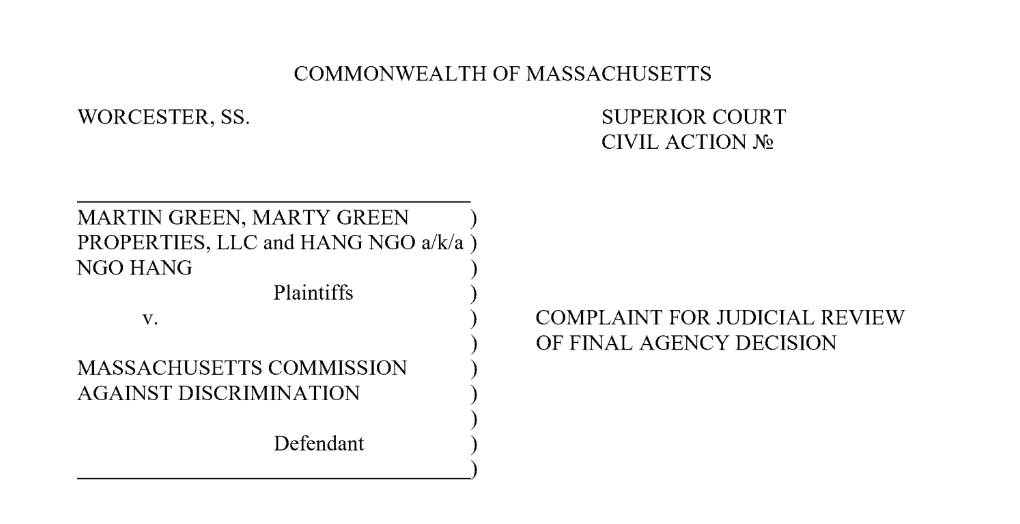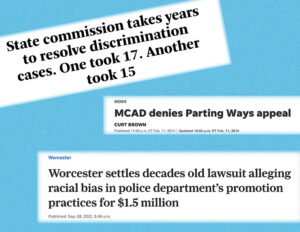Martin Green v. the MCAD: Green Loses Appeal in Housing Case as Anticipated
. Posted in News - 0 Comments
By Kimberly Rau, MassLandlords, Inc.
A May 2024 Massachusetts Commission Against Discrimination (MCAD) appeal upheld a prior MCAD ruling that stated Martin Green, a Massachusetts property manager, discriminated against a former tenant and her boyfriend by denying them access to a support animal.

An American Staffordshire Terrier (not this one) named Sam was at the center of attention in Green’s recent fight against the MCAD, who ruled that regardless of whether Sam was a service animal, she did prompt her owner to take care of his health. (Image: Katie Bernotsky for Unsplash)
Background: Martin Green v. the MCAD
The case dates back to 2017, when Green, a property manager for a group of Northbridge rentals owned by Hang Ngo, reached out to tenant Nicole Evangelista. Green stated that he had received complaints about her boyfriend’s dog, Sam. The boyfriend, Joshua Fortin, was not on the lease, but was staying in the rental with Sam. This was in violation of a no-pets policy.
Evangelista replied that Sam was a service dog. She explained that Sam was able to detect drops in Fortin’s blood sugar, which allowed Fortin, a diabetic, to treat his condition. Green declined to discuss the matter in a series of emails, and Evangelista filed a complaint with the MCAD, which decided in her favor in 2022.
Green appealed the decision on the grounds that Sam was not a service animal. He had a service dog trainer testify that dogs who detect blood sugar changes must be specially trained. Therefore, Sam, who had no specialized training, was likely not a service animal, the trainer testified. The hearing officer for the MCAD determined that Sam was still a support animal (as distinct from a service animal), because the dog’s behaviors toward Fortin compelled him to check his blood sugar and take care of his health.
The hearing officer determined that Green had acted in a discriminatory fashion. The MCAD ruled Green had not engaged in dialogue with the tenants and had retaliated against them by sending them notices to quit after they had complained to the MCAD. Green defended himself against the charges. He stated the notices to quit were for nonpayment of rent, and were given to multiple residents, not just Evangelista. Still, he was ordered to pay thousands in damages.
In comments to MassLandlords for our original story in 2023, and elsewhere online, Green has stated he feels the MCAD overstepped its bounds in determining Sam was an assistance animal. He said that he felt the MCAD was inconsistent in stating whether Fortin was actually a tenant (Fortin did not appear on any lease, nor Evangelista’s application for rental assistance). If Fortin was not a tenant, Green argues, then he did not need a reasonable accommodation to have a pet living with him at that address.
Green has also been vocal about the fact that he is not insensitive to people with disabilities, stating that he has a background in social work and has had a lifelong role in helping his older brother, who is disabled.

Martin Green expected to lose his appeal with the MCAD, and has filed for a judicial review with the Worcester County Superior Court. (Image: Public Domain)
2024: An Appeal Lost, as Green Expected
Upon appeal, the MCAD stuck by its original decision, with one change: It upgraded Sam to an “assistance animal” instead of a “support” or “emotional support” animal.
“Failing to prove that Sam was a service animal does not automatically relegate her status to a mere pet, and the record supports the conclusion that Sam was an assistance animal,” the decision reads.
“…Sam’s presence and behavior, with or without training, alleviated the effects of Fortin’s disability, both in terms of relieving anxiety and in the prompting to actually check his blood sugar. Complainants therefore proved that Sam was an ‘assistance animal’ in the broad sense, not just at the level of ‘emotional support animal,’” it continues.
The MCAD also upheld the prior determination that Green did not engage in a proper dialogue with Evangelista when she requested an accommodation.
“Rather than engage in the interactive dialogue, Green made assumptions about Complainants and about Sam and denied the request for accommodation,” the decision states.
The appeal document stated that, going forward, all animals that provide any kind of support to someone with a disability would be called “assistance animals,” regardless of whether they are trained. This appears to be the middle ground between “service animal” and “pet.”
“[G]iven the rampant use of varying labels for such animals, and to dispel further arguments like those from Respondents urging a strict dichotomy between federally defined “service animals” and house pets in the context of M.G.L. c. 15IB housing cases, we herein adopt the umbrella term ‘assistance animal’ as applicable to reasonable accommodations in housing,” the finding reads.
“To be clear, the record contains sufficient evidence in support of the Hearing Officer’s conclusion that Sam’s presence was reasonably necessary to afford complainant an equal opportunity to use or enjoy the premises, and that conclusion is free from legal error,” it continues.
The fines imposed at the earlier hearing have been upheld. Green and landlord Hang Ngo were ordered to pay Fortin $10,000 for emotional damages, plus interest, and to pay Evangelista $20,000 for emotional distress, plus interest. Green was ordered to pay a $7,500 penalty to the commonwealth; his company, Marty Green Properties LLC, was ordered to pay an additional $5,000; and Ngo was ordered to pay a penalty of $5,000. This totals $47,500, and doesn’t include any attorney fees or accrued interest. The respondents were also ordered to attend a disability training session.
Conclusion
This ruling likely did not come as a surprise to Green, who told MassLandlords in 2023 that he was already counting on losing the appeal. Once that happened, he told us, he was planning to bring his case to Superior Court. Green has further stated that he has requested an external investigation of the MCAD.
We can understand Green’s frustration. He went into his case and appeal figuring he would lose, and he was right. The MCAD appears to have moved the goalposts during this hearing process. Evangelista said that Sam was a service animal, which has a specific definition under the ADA. When it was proven Sam was not a service animal, the MCAD ruled she was still not a pet, and designated her as a support, and, later, assistance animal. They said regardless of her designation, she helped Fortin, and therefore was necessary. This amounted to the MCAD putting its finger on the scale and creating a sharp, chilling effect for any landlord tempted to think “B.S.” about an alleged support animal. Green argued this was not within the MCAD’s scope.
However, Green was incorrect when he did not engage in a dialogue with his tenant about Sam. This is in violation of the law: A tenant does not have to use the phrase “reasonable accommodation” to get such a consideration, and Evangelista telling Green that Sam was a service animal should have been enough to get the conversation started. That refusal alone was enough to make Green lose his case, regardless of what kind of animal Sam was or whether the MCAD remained impartial.
As of publication, Green has filed an appeal with the Worcester County Superior Court. He is requesting a full judicial review of the MCAD’s decision.
We will continue to update this story as the case progresses.





